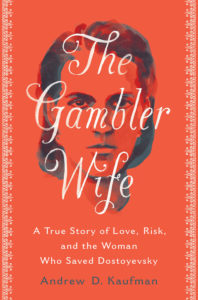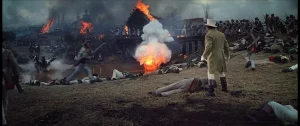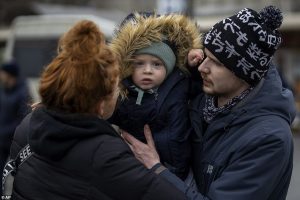How The People of Ukraine Are Living Out The Deepest Lessons of Tolstoy and Dostoyevsky
Pierre Bezukhov at the Battle of Borodino in War and Peace
Ukraine And Russia
Whenever I mention that I teach Russian literature these days, I get a weird look of surprise, confusion, or even disgust. I’m not alone. A few weeks ago a German university canceled a class on Dostoyevsky in order to make a clear statement of their opposition to Russia’s invasion of Ukraine. Russian performers are getting canceled if they refuse to denounce Putin. Rivers of Russian vodka are currently flowing in sinks, toilets, and back alleys across the U.S.
But let’s be clear: The atrocities being committed in Ukraine are the result of Putin’s cruelty and megalomaniacal fantasies, not those of the Russian people, or Russian performers and writers.
In fact, we can learn a lot from Russia’s own great authors when it comes to the importance of finding beauty and humanity in even the most horrid situations.
Many of these writers were themselves incarcerated or even executed for their criticism of the government. They were the ones who spoke truth to power in a repressive society and bore the moral conscience of a nation. The values they celebrated in their writings were human freedom, decency, compassion, beauty, and truth.
Faith in Life
Dostoyevsky spent four years in a Siberian prison and was committed to four more years of mandatory military service for participating in a socialist revolutionary circle, and that was only after receiving a last-minute reprieve from execution by firing squad.
A little over a century later Alexander Solzhenitsyn was arrested for having criticized Stalin in private correspondence to a friend, and was sentenced to eight years in one of the worst prison camps in the “Gulag.” Yet their writings continually remind us not only what human beings are, but what we can become.
Both writers emerged from the hell of prison neither cynical nor embittered, but with a redoubled commitment to creating works of art that celebrate life and perseverance amid the pain and injustice all around them.
And then there was Tolstoy, who as a young man witnessed a public execution in Paris, lived through the European revolutions of 1848 and the first bloody Russian revolution of 1905. In the final decade of his life he was reading daily newspaper accounts about pogroms and violent workers riots. He watched in horror as his country razed villages and destroyed non-Russian populations as part of their centuries-long effort to subjugate the Caucasus.
Yet what counts is this: Having lived through all that, he never lost his faith in human promise. And, nowhere is this faith more powerfully expressed than in his greatest masterpiece, War and Peace.
In this novel describing Napoleon’s protracted war with Russia and ultimate invasion in 1812, Tolstoy takes us to the center of battlefields drenched in blood. He shows us incompetent and cynical leaders and cruel politicians, including one Moscow governor who tosses a teenage political prisoner to an angry mob to be devoured.
Finding Light in Ukraine Darkness
But he also gives us some of the most memorable moments of transcendent beauty in all of world literature—like a soldier, lying wounded on the battlefield of Austerlitz, gazing up at the lofty, infinite sky and discovering for the first time the gorgeous immensity of the universe.
Tolstoy reminds us that moments of beauty and light can be found even in the darkest ugliness.
Such moments are happening every day in Ukraine.
Young mothers give their toddlers some semblance of normalcy by allowing them to run around and play in parks beneath the smoke-filled sky. Nannies coo over newborn babies in makeshift delivery rooms set up in the basement of apartment buildings. A frontline worker I saw interviewed on TV allowed herself a moment of lightness amid her description of the horrors she’s witnessed. “I’m going to need lots of therapy when this is over,” she said.
And people are still waking up every day in Ukraine to do their jobs, even if that means grabbing a gun and manning a checkpoint in their neighborhood or preparing Molotov cocktails to be hurled at Russian tanks.
We should celebrate these daily triumphs—big and small—occurring in the midst of all the hardship. For such moments are themselves are a form of resistance.
By embracing the miracle of life and asserting their right to choose their own response to their dire circumstances, Ukrainians are exercising the one freedom that nobody can take away. In so doing they are living out one of the deepest lessons of Russian literature: fate is what happens to us, but destiny is what we do with it.
As Tolstoy said: “No matter how old or sick you are, how much or little you have done, your business in life not only isn’t finished, but hasn’t yet received its final, decisive meaning until your very last breath.”
I’d love to connect with you on Twitter, Facebook, my private FB Group, Linked In, Instagram, Goodreads, YouTube, and Amazon, and sign up for my newsletter here.
Follow Books Behind Bars on Twitter and Facebook.
Order The Gambler Wife: A True Story of Love, Risk, and the Woman Who Saved Dostoyevsky, Finalist for the 2022 PEN America Literary Award in Biography

Mailing List
To receive monthly articles, inspiration, and updates, including updates about Andy's new book, The Gambler Wife: A True Story of Love, Risk, and the Woman Who Saved Dostoyevsky, please fill out the form below.
Mailing List
To receive monthly articles, inspiration, and updates, including updates about Andy's new book, The Gambler Wife: A True Story of Love, Risk, and the Woman Who Saved Dostoyevsky, please fill out the form below.


This was such a good post, Andrew. Bravo!